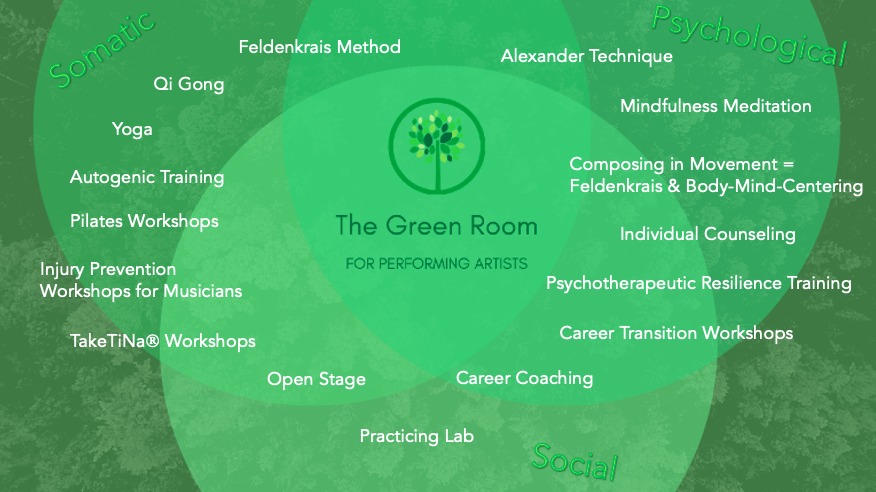Seeds in the Wind
An introduction to TGR The Green Room
By Heather O’Donnell, founding director of The Green Room, psychologist, and former professional musician
Talk for the Gürzenich Orchestra Cologne, December 2nd, 2021
The Green Room is a center that supports the health of performing artists – musicians, dancers, and actors.
We are a non-profit organization, the first of its kind, which is a wonderful distinction, but it also makes it necessary to justify why our work is necessary, and how we can help performing artists become more resilient in living with workloads that include enormous physical, psychoemotional and professional challenges.
In order to do this, I’d like to start with my own history as a professional pianist. I had an active and fascinating career between the years of 1995-2010. But during the latter years, I became ‘a walking and talking encyclopedia of musicians‘ ailments’: overuse syndrome, chronic pain, neuromuscular disorders leading to (among other things) trembling and diminished sensation in the fingers. Added to this were psychological ailments: chronic stress (often as a result of a body that was seemingly not cooperating), depression, anxiety... In many ways, I was an outlier - I experienced a rather spectacular implosion of my career. Most of my colleagues didn’t experience this amount and severity of playing-impacting disorders. In my circle of colleagues and friends, only a handful encountered similar problems (or admitted them freely), and these colleagues tended to, rather quietly, disappear from the profession. As difficult as my own experience was, I also believe it was fundamentally helpful. I got to intimately know healthcare offerings available for musicians. I had an insiders‘ view of the healthcare landscape: what works well, and what doesn’t work so well, which services are available, and which are lacking. This, in addition to the eleven years of study, research, and experience working in musicians‘ health that followed my professional work as a musician, is the basis for the concept and design of The Green Room.
Secrets and Taboos
There is still quite a lot of secrecy about physical and mental health problems in performing communities. This has a large impact on levels of health and wellbeing within these professions. To focus on one branch: musicians tend to delay seeking medical or psychotherapeutic help until the problems are entrenched and therefore more difficult to successfully address. Musicians tend to „self-medicate“ (i.e. alcohol and drug consumption, which includes beta-blockers) more than other professional groups. There often exists a culture of secrecy surrounding mental and physical health crises in musicians‘ communities. These issues have been scientifically studied throughout the last 50 years and are repeatedly discussed in conferences and scientific journals on musicians‘ health (some examples are below).
Medical doctors see musicians at their very worst. They often are the most vocal supporters for programs that address prevention, programs that treat musicians as the “high-performance athletes of the fine-motoric” that they are.
Elite athletes have access to offerings that concentrate on injury and illness prevention, wellness promotion and education, rehabilitation following injury or illness, and psychological performance coaching.
Why not musicians? Why not dancers? Why not actors? Taking a look at the kinds of services offered to professional athletes highlights this crass discrepancy.
What do we do in The Green Room?
The Green Room is designed to provide health services to artists in order to 1) help prevent crises, 2) support them in lifelong artistic growth and development, 3) assist in reentry into professional contexts following crises. We engage on three levels:
The physical: through courses in the Feldenkrais Method, Alexander Technique, Yoga, Pilates, Qi Gong, Body-Mind Centering ®, among others;
The psychological/emotional: through individual consultations and coachings, mindfulness courses, and workshops on psycho-physical aspects of artistic practice;
And the social: with workshops on practicing, conflict management, open stage events, and creative career management.
We are a not-for-profit social enterprise, which means our offerings are priced as low as possible, with many free classes, workshops, and events. We are not rigid adherents to particular methodologies and respect the individual needs, predispositions, and processes of each artist engaging with our center.
Seeds of health
We throw our ‘seeds of health’ out in the wind, and trust that artists will sense which of our offers are most personally relevant, needed and helpful. If we can assist them in the choice of health-offerings, we gladly do this. We also recognize that health is a highly personal issue. Sometimes a walk in nature or a glass of wine with friends can be the right health-promoting activity for that given moment. In professions in which the training was often highly-directed and prescriptive, with an inflexible sense of “right” and “wrong”, we want to keep our doors wide open. We want to assist artists in developing and strengthening their own senses of what keeps them whole, what suports them, and what provides them with (to paraphrase the pianist Artur Schnabel) "a firm ground on which they can freely walk”.
Baumol, W.J. & Bowen, W.G. (1966). Performing Arts. The Economic Dilemma. A study of problems common to theatre, opera, music and dance. New York: The Twentieth Century Fund.
Kenny, D. T., & Ackermann, B. (2009). Optimizing physical and psychological health in performing musicians. In The Oxford handbook of music psychology (pp. 390-400). Ox- ford: Oxford University Press.
Fishbein, M., Middlestadt, S. E., Ottati, V., Straus, S., & Ellis, A. (1988). Medical problems among ICSOM musicians. Medical Problems of Performing Artists, 1-8.
Vaag, J., Bjørngaard, J. H., & Bjerkeset, O. (2016a). Symptoms of anxiety and depression among Norwegian musicians compared to the general workforce. Psychology of Music, 234-248.


